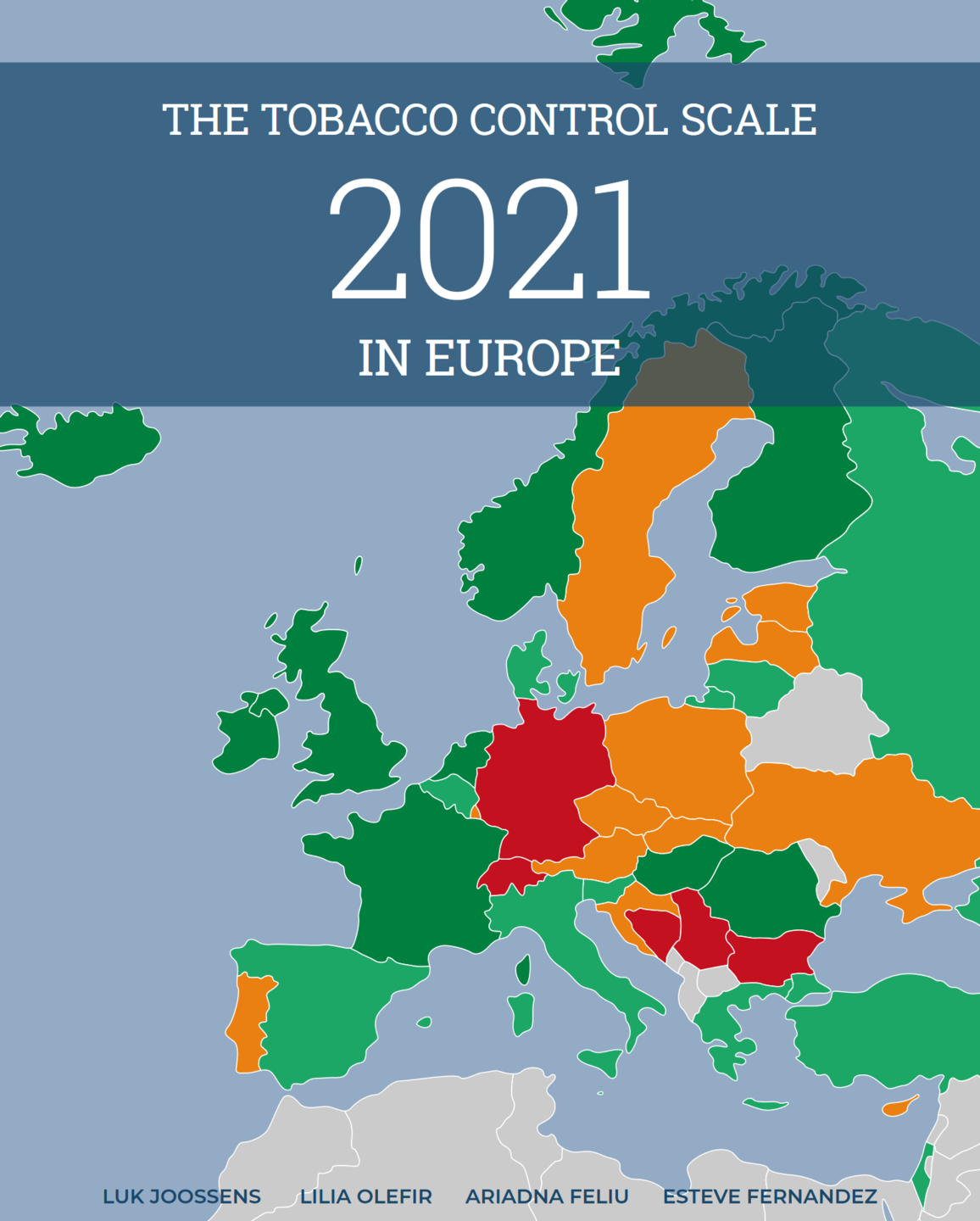Tobacco Control Scale
Leading Europe toward a tobacco-free future
|
«The Tobacco Control Scale 2021 in Europe» For the past 15 years, the Association of European Cancer Leagues has been comparing the measures taken by European states to combat smoking and publishing the results in their “Tobacco Control Scale in Europe”. The latest edition of this ranking, produced in 2021, was published on 2 December 2022 during the “ICO-WHO Symposium on Tobacco Control” in Barcelona. |
Six essential and effective tobacco-control measures are evaluated:
- Price increases due to tobacco taxes.
- Comprehensive smoking bans in public places and the workplace.
- Improved public information campaigns.
- Complete bans on tobacco advertising and promotion.
- Unflinching health warnings on packs of tobacco.
- Support for smokers who want to quit smoking, including access to medication.
Under the Tobacco Control Scale, states are rated on how well they implement these six measures, each of which is judged according to its effectiveness. Those that have proven to be particularly effective in other countries are given greater weight.
In the European “Tobacco Control Scale 2021” ranking, Switzerland lost a place compared to 2019 (now 36th out of 37 countries) with regard to tobacco prevention measures in Europe. The conclusion of the Association of European Cancer Leagues in this regard is as follows:
«Switzerland remains the favourite country of tobacco multinationals.»
Switzerland falls further and further behind
As in 2019, the first three places were still occupied by Ireland, the United Kingdom, and France in 2021. Since 2007, the United Kingdom and Ireland have appeared each time in the top three of the rankings. The successes recorded by these two countries are attracting attention: in the United Kingdom, the proportion of adult smokers fell by five percentage points between 2014 and 2022, to 13%. In Ireland, the proportion of smokers fell from 23% to 16% between 2015 and 2022. For comparison: 27% of the Swiss population smoke, even reaching 32% among adolescents and young adults. These figures have stabilised at a high level since 2007.
Switzerland occupied the penultimate place in the 2021 ranking, just ahead of Bosnia and Herzegovina, which appeared on the list for the first time. Having lost yet another place compared to 2019, Switzerland has therefore been steadily falling in the rankings for the last 10 years (2013: 18th place, 2016: 21st place, 2019: 35th place). Switzerland once again obtained particularly poor marks in the area of restrictions on tobacco advertising: no other country evaluated has scored so poorly in this category in recent years.
Switzerland has not yet ratified the World Health Organization’s (WHO) 2004 International Framework Convention on Tobacco Control (FCTC), which defines common minimum legal standards. Apart from Switzerland, only Andorra, Liechtenstein, and Monaco have yet to do so in Europe.
If the popular initiative "Yes to protecting children and young adults from tobacco advertising (No tobacco ads for children and young adults)" were to be implemented by the Federal Council and Parliament in accordance with what the people decided, Switzerland could move up three or four places in the ranking by obtaining for the first time a good score in the “Complete bans on tobacco advertising and promotion” category. Unfortunately, Switzerland continues to perform very poorly in all other categories (price, protection against second-hand smoking, warnings, etc.).
Tobacco taxes too low
Tobacco taxes in Switzerland are far too low, particularly in relation to wages and costs. Parliament blocked this protection mechanism under pressure from the tobacco lobby: since 2013, the Federal Council no longer has the authority to increase tobacco taxes. While the World Health Organization (WHO) recommends a tax share of at least 75%, this is around 60% in Switzerland. From mid-2024, electronic cigarettes will also be taxed for youth protection reasons. The Swiss Association for Tobacco Control and its member organisations welcome this move. Unfortunately, neither the Federal Council nor Parliament has had the courage to set the tax rate for e-cigarettes at a level that would have a real preventative effect, nor the resolve to carry out a complete overhaul of tobacco taxes to increase them for all tobacco products.
Conclusion
Ireland is in first place with 74 points out of 100, but there's always room for improvement even among leaders like Ireland. The TCS report is more than just a ranking: it’s also a wake-up call. Europe's fight against tobacco is moving forward and every country must step up their efforts. With the TCS report, countries now have a roadmap for building a healthier tobacco-free future. It’s time to act, to innovate, and to take leadership in the fight to control tobacco consumption around the world.
You can download the full report on: https://www.tobaccocontrolscale.org/wp-content/uploads/2022/12/TCS-Report-2021-Interactive-V4.pdf.
